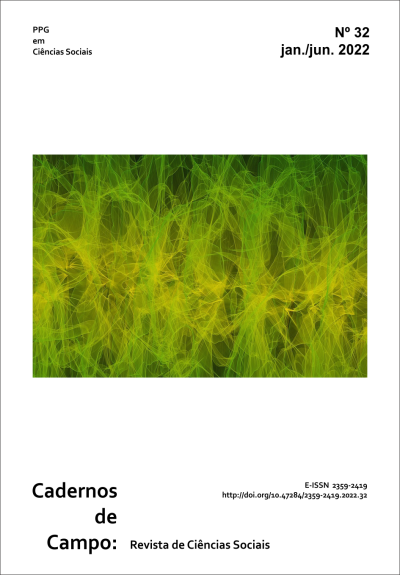The Streets that Remains in Flames
Cinema and the Struggle for the Right to the City in São Paulo
DOI:
https://doi.org/10.47284/2359-2419.2022.32.345367Keywords:
cinema, politics, short films, human rights, cityAbstract
This article aims to analyze four short films produced in the city of São Paulo in the mid-2010s. Based on them, follows the discussions on the relationships between the processes of establish meanings by the creators in their personal experiences and the sociocultural moment that involved the productions in their creation. The methodology used was the film analysis (ADAMATTI, 2020), operating in synergy with the sociology of cinema proposed by Pierre Sorlin (1985). It is a work that reveals documentaries and fictional films in their discursive formats, that is, as artistics representations that translate sensitive concerns about urban themes and the echoes of the political events of 2013 in the city. We continue in this way in order to understand the engagement and creation of young filmmakers as themes of political and social thought, and how all of this is manifested in contemporary authorial cinema.
Downloads
References
ADAMATTI, M.; UCHÔA, F. Cinema, estilo e análise fílmica. ArtCultura, Uberlândia, v. 22, n. 40, jan./jun. 2020, p. 289-308.
ALMEIDA, M. J. A. A educação visual da memória: Imagens agentes do cinema e da televisão. Pró-posições, Campinas, v. 10, n. 2, p. 9-25, 29 jul. 1999.
BAZIN, A. O que é o cinema? São Paulo: Ubu Editora, 2018.
BERNARDET, J. C. Cineastas e imagens do povo. São Paulo: Brasiliense, 2003.
CARLOS, A. F. A. Henri Lefebvre: o espaço, a cidade e o direto à cidade. Revista Direito e Práxis, Rio de Janeiro, v. 11, p. 349-369, 2020.
GONÇALVES, M. A. O real imaginado: etnografia, cinema e surrealismo em Jean Rouch. Rio de Janeiro: Topbooks, 2008.
MACHADO, A. Novos territórios do documentário. DOC On-line n. 11, 2011. Disponível em: http://www.doc.ubi.pt/11/dossier_arlindo_machado.pdf. Acesso em: 07 jul. 2022.
MARTÍN-BARBERO, J. Cidade virtual: novos cenários da comunicação. Comunicação & Educação, São Paulo, v.11, p.53-67, 1998.
MENEZES, P. Sociologia e cinema - aproximações teórico-metodológicas. Teoria e Cultura, Juiz de Fora, v. 12, p. 17-36, 2017.
NICHOLS, B. Introdução ao documentário. Campinas: Papirus Editora, 2009.
PIPANO, I. Saber que o outro me pensa: comentários sobre estética e política do documentário e educação. In: LEITE, C.; OMELCZUK, F.; REZENDE, L. A. (org.) Cinema-Educação: políticas e poéticas. Macaé: Ed. NUPEM, 2021. p.329-352.
SALLES, J. M. A dificuldade do documentário. In: MARTINS, J. S.; ECKERT, C.; CAIUBY NOVAES, S. (org.). O imaginário e o poético nas Ciências Sociais. Bauru: Edusc, 2005. p. 57-72.
SORLIN, P. Sociologia del cine: la apertura para la historia de mañana. México: Fondo de Cultura Econômica, 1985.
UCHOA, F. O menino e o mundo (2013) de Alê Abreu: campo-cidade, estilo indireto livre e o direito à cidade. E-Compós, [S. l.], v. 21, n. 3, 2018. Disponível em: https://www.e-compos.org.br/e-compos/article/view/1419. Acesso em: 7 jul. 2022.
XAVIER, I. O discurso cinematográfico: a opacidade e a transparência. São Paulo: Paz e Terra, 2005.
Filmes:
À BEIRA. Direção: Gláucia Shiva. [S. l.: s. n.], 2016. 1 vídeo (20 min).
A CIDADE É UMA SÓ. Direção: Adirley Queiroz. [S. l.: Vitrine Filmes], 2013. 1 vídeo (73 min).
AQUARIUS. Direção: Kléber Mendonça Filho. [S. l.: Vitrine Filmes], 2016. 1 vídeo.
CONCERVANTES. Direção: Giba Freitas. [S. l.: s. n.], 2016. 1 vídeo (15 min).
https://www.youtube.com/watch?feature=youtu.be&v=IZs02sHwPUs&app=desktop
ERA O HOTEL CAMBRIDGE. Direção: Eliana Caffé. [S. l.: Vitrine Filmes], 2017. 1 vídeo (93 min).
LA CHASSE AU LION À L'ARC. Direção: Jean Rouch. [S. l.: s. n.], 1965. 1 vídeo (88 min).
LIMPAM COM FOGO. Direção: Rafael Crespo, Conrado Ferrato e César Vieira. [S. l.]: A.H.F, 2016. 1 vídeo (85 min).
OLDSTOCK. Direção: Demétrio Zanini. [S. l.: s. n.], 2016. 1 vídeo (17 min). Disponível em: https://www.youtube.com/watch?v=EWxITuFX34Y&feature=youtu.be. Acesso em: 12 set. 2022.
RAÍZES QUE LEVO. Direção: Bruno Filarde. [S. l.: s. n.], 2016. 1 vídeo
Downloads
Published
Issue
Section
License
Copyright (c) 2022 Cadernos de Campo: Revista de Ciências Sociais

This work is licensed under a Creative Commons Attribution 4.0 International License.









